Hey pollies, what have you done for us lately?
Haven't made up your mind about who to vote for yet? This is all you need.
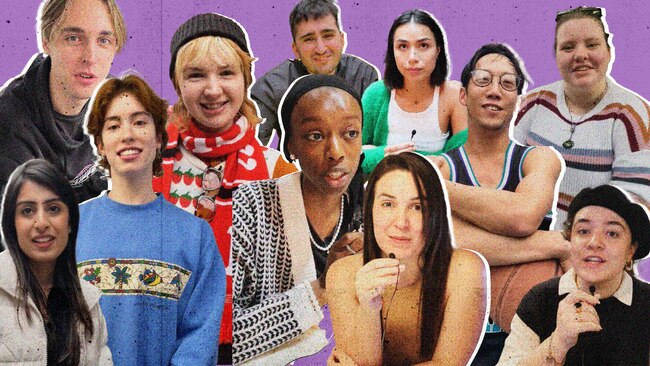
Haven't made up your mind about who to vote for yet? This is all you need.
What do you want to achieve in the next year?
Maybe it sounds simple, or daunting, but it is really important for understanding the aspirations of modern Australia.
That’s why we asked a bunch of you about your hopes and dreams to glean an understanding about what really matters and ultimately how this aligns (if at all) with the promises being made to win our votes ahead of May 21.
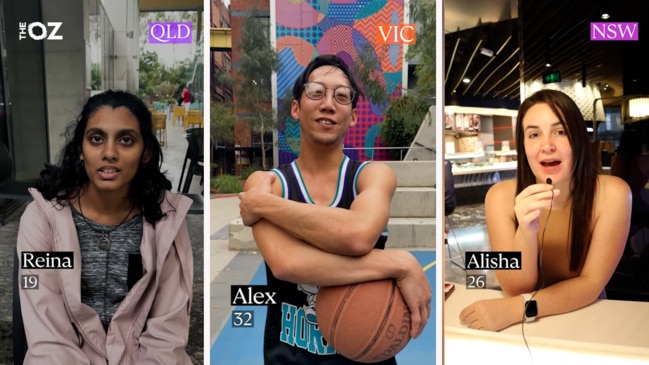
We’re T-minus 4 days away from voting day. Over the past five weeks the two old guys who want to be the Prime Minister come Saturday night have taken to the streets pleading (ain't too proud to beg) for your vote. But what have these (mostly) suit/akubra/high-vis wearing politicians, really done to earn it?
Like the noble steeds we are, we dutifully trotted through a field of policies that may actually matter to the 4.4 million of us aged-under-35 voting this weekend.
We’ve organised this according to the key areas you said you have aspirations in.
We at The Oz have broken this up into the key areas you have told us you really care about. Use our interactives to compare the pair: the promises, positions and policies of the crew in blue ties and block-coloured power suits (aka The Coalition) and the mob in the (slightly too long and sometimes too short) red ties and bold pant suits (aka Labor). We've kept it to the policies of the major parties, because they are the ones who could form government. I’ve thrown in my POV on each point, in case it helps.
Grab your snorkel and let’s dive in.
My Education
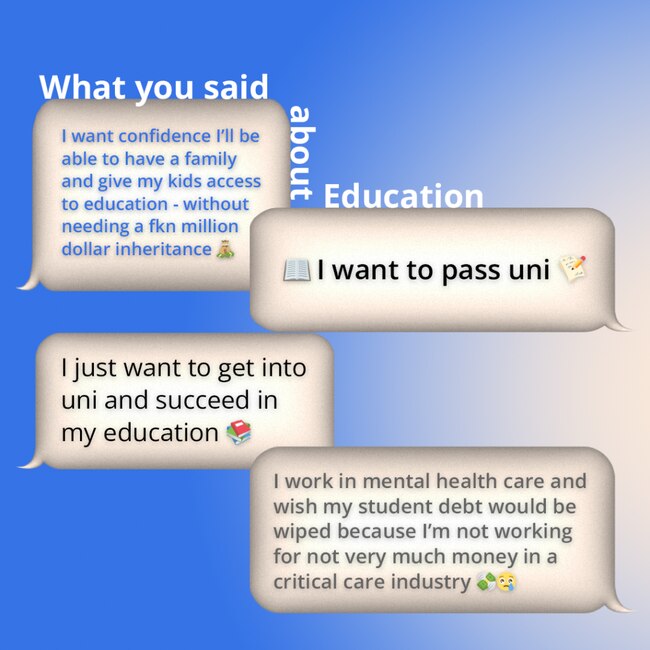
Liv’s take: Cost of living bites. Prices going up is bad news for all of us who want to buy anything, obviously. Digging deeper into our pockets hurts, and there is no difference when it comes to uni fees.
Big changes to university funding at the end of 2020 made the cost of arts degrees much more expensive but science and maths degrees less so in an attempt try and entice students to STEM subjects.
Although the new fee regime began last year it's now having an impact on Australia's cost of living in general and has been a direct contributor to the rise in inflation.
While both parties will continue existing fee-help arrangements that enable students to effectively use Afterpay to pay for courses (aka HECS), a major issue students (especially those studying Arts) will face is the cost of their studies have been jacked up so it’ll likely take them longer to pay off that debt. The rising cost of living also means students who want to live out of home will have to take on extra work if they want to pay for rent, which is expected to increase further this year as a rise in inflation rates sparks higher mortgage rates and see landlords attempt to offset this with rent hikes.
When we asked you what you wanted to achieve this year, a couple of you said you wanted to learn a language. Unfortunately, there’s nothing pledged by either major party to directly help with that. (Suggestion: try Duolingo).
But both Labor and the Coalition are providing funding for more training places and the opposition is homing in on areas with “skills shortages”, so if you want to pursue a trade or vocation through TAFE in areas such as nursing, tech, or teaching, you’re in luck.
It's your vote but Labor's wannabe teacher incentive of $10,000 scholarships is a case of “you scratch my back and I’ll scratch yours” and will help plug holes in teaching vacancies while helping students while they’re at uni. Win-win.
My home

Liv's take:
In Australia, roughly a third of people own their home, a third have a mortgage and a third rent. So what are the major parties offering when it comes to addressing the critical issue of housing affordability?
Well, housing has become one of the major issues of the campaign and despite dropping a few H-bombs (housing policy announcements) here and there, Scott Morrison kept his final wildcard - The Super Home Buyer Scheme - close to his chest until the Coalition party’s official campaign launch held just six days out from polling day.
Fearing popular support, Labor have launched a full-scale attack on the proposal to help you tap your super savings for up to $50K, insisting it will jack up house prices and even destroy your nest egg. (By the time someone turning 30 today can access super though it will be 2057! Net zero!)
Now, what I like about the Coalition’s housing pitch compared to Labor’s is: it's not just helping 10,000 first home buyers, it's effectively shaving off "saving time" and getting you to your deposit more quickly, if you're in a couple you can pool together, you’re effectively borrowing from yourself and you can use it in conjunction with first home buyers.
But (some) economists say the policy is a bad idea. But (other) economists say it's all right. (Who said economics was a science?) Who am I to argue? I DID NOT do a STEM degree.
Tit for tat aside, I can't help but roll my eyes when Labor says they're providing 10,000 places through their shared equity program. That's barely scratching the surface and will go little way to deliver the structural reform needed to address the incredibly important issue of housing.
They do score a few brownie points for pledging to build 30,000 new social and affordable houses for frontline workers and women fleeing domestic violence, but let’s face it: there’s a current undersupply of about half a million social housing dwellings, and what’s being promised is a veritable drop in the ocean.
The reality is home ownership rates among 25-34 year-olds has fallen off a cliff, declining from 60% in 1981 to 45% in 2016 and these rates are unlikely to bounce back over time without major structural reform.
But it's not just owning a house, it's renting too. While rental costs declined at the onset of the pandemic due to the closure of international borders and less demand, this is expected to reverse in the coming months as migration recommences, putting pressure on rental supply.
And what are the major parties doing to address this? Nada. Both policies don’t do much to address the housing supply issue which is biting, hard, all around the country.
The total number of properties available for rent in March was the lowest it has been since 2003 and 24 % lower than the same time a year earlier. Despite there being more than 8 million renters across Australia they haven't been a major target of any election promises from either party so far.
As for the winner on this? I’m on the fence. The Coalition pitch would get more first home buyers onto the property ladder by sheer virtue of the more places on offer (35,000 compared to 10,000, as well as the ability to use super if you want to). But it does it go far enough in terms of structural reform? I’d like to see whoever wins take the issue of housing affordability and availability to another level. A girl can dream.
My Health
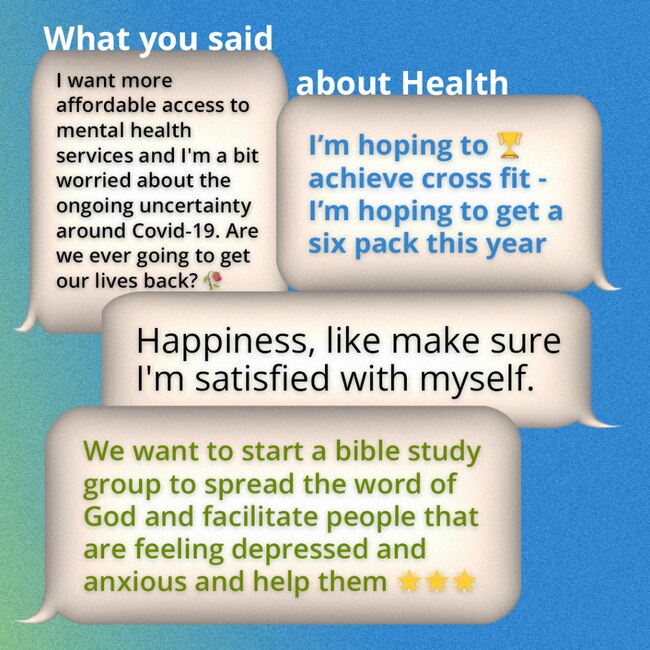
Liv’s take:
There’s not a lot to separate Labor and the Coalition when it comes to the health perks they’re batting their lashes with. In fact, a couple of key promises such as cheaper meds and IVF for cancer sufferers have all been matched (or one-upped) by Labor.
Scott Morrison has always been big on improving mental health and has followed through with more funding for things like suicide prevention services, but speak to anyone looking to get mental health services right now and they’ll tell you waiting lists for psychologists are months long. As for Labor’s urgent care clinics, they sound good in theory, but Anthony Albanese has copped a bit of slack for stumbling on how much they would cost and this pitch has even been criticised by the Australian Medical Association - which is never a great sign.
There’s also a major glut when it comes to health care services in regional areas and I’m not convinced either party’s offerings are going to cut the mustard when it comes to real improvements in GP and nurse shortages in the bush and smaller cities.
My security

Liv’s take:
There’s not a lot to work with here and no real substantive pitch difference between the major parties.
Scott Morrison was eager to fight this election on national security, and generally the Coalition is seen as superior on the topic. However this got a little murky when the Solomon Islands (a really important part of the Pacific Ocean - TIP: Watch THE THIN RED LINE on your favourite streaming service) signed a security pact with China who have been taking the mickey out of the Western world for a few years now. Labor want everyone to think the PM also stuffed up our relationship with France by first signing them up to build submarines for us, only to dump them to jump into bed (so to speak) with the UK and the US to set up the old boys trio (AUKUS, get it A-UK-US) to ward off Chinese aggression by building some serious nuclear subs instead. Labor are a bit antsy that the Coalition didn't let them in on the secret deal until the last minute. The PM seemed to suggest on Monday that if they told them Labor would have told the Chinese. All in all, it's all a bit Awk-us.
My climate
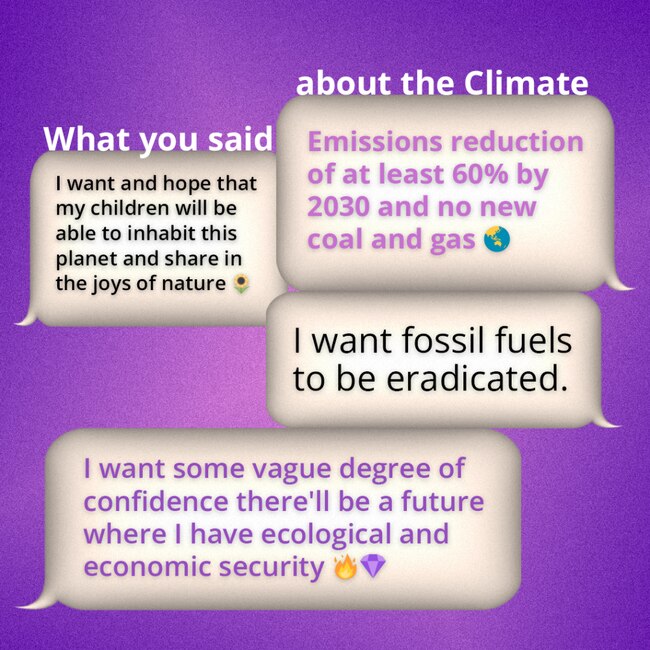
Liv’s take:
The Coalition has been tying itself in knots over net zero for years but finally signed on the dotted line last year. Its commitment to net zero by 2050 now means there’s less difference between the parties on this, which is intentional.
Labor’s ambitious targets at the last election scared off some of the party’s traditional base (such as coal miners) so Anthony Albanese has been careful to pursue a more middle ground approach. The fact they’ve committed to an interim target of 43% by 2030 means their pitch is superior, but minor parties like the Greens and the teal independents aren’t impressed and say neither party have got it quite right. Both parties are also taking a slightly different approach about how they’ll reach this target. The government is funding research and development to lower the cost of clean energy by investing millions into things like hydrogen hubs, while the opposition is promising to place caps on Australia’s biggest industrial polluters.
My future, family and work
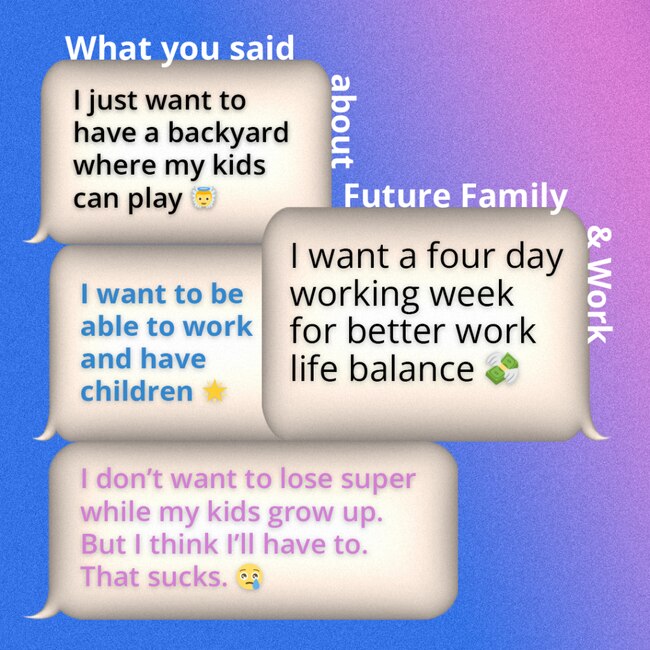
Liv’s take:
The Coalition's recent changes to the Child Care Subsidy were well-targeted and will signal an improvement for more than 250,000 families. But Labor’s policy is broader and more ambitious. By bringing down out-of-pocket costs for a much wider group of families, it’ll have a positive economic flow-on effect as it’s likely to increase workforce participation. It does, however, cost more than twice as much.
My Integrity
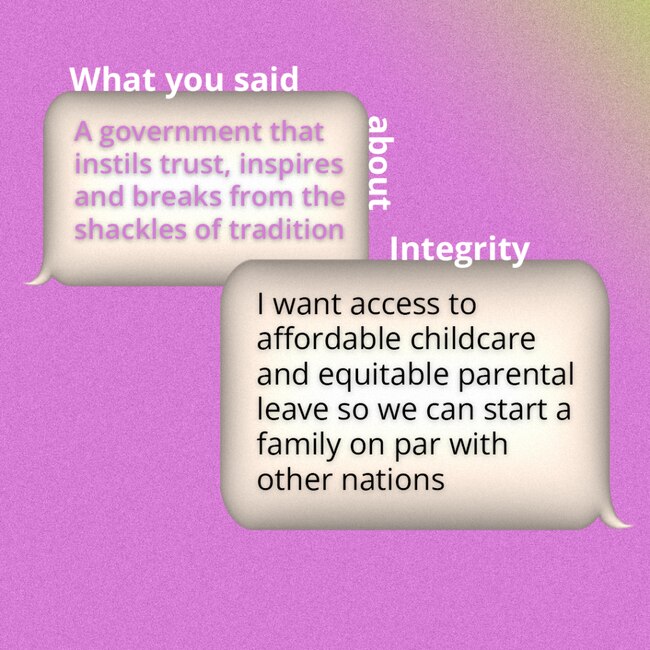
Liv’s take:
Everyone seems a little obsessed with integrity all of a sudden. It's a vibe. Both parties are offering scary new bodies with powers to investigate complaints and allegations of corruption, but Labor has gone a couple of steps further by promising to roll it out by the end of this year. Their body will also be able to investigate historic allegations, as far back as 15-years, and will be more aggressive than the Coalition’s offering. When it comes to “women’s issues” this is a significant weakness for the Coalition following its handling of allegations of rape and sexual misconduct within Parliament House. Given the state anti-corruption bodies have ended the careers of formerly high-flying politicians from Labor and the Coalition, whatever happens with these laws if they ever come in, it's going to generate lots of headlines.
My Spending Power
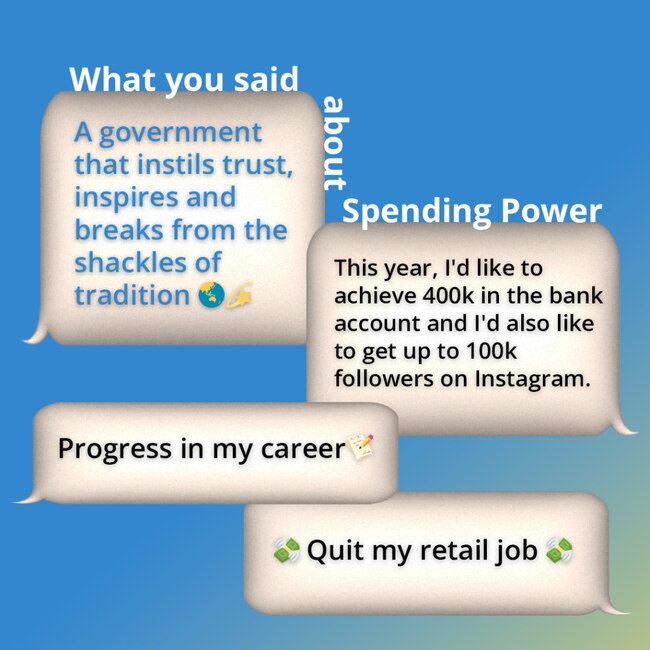
Liv’s take:
Labor’s big issue on taxes is that everytime we ask them if they will raise taxes, they throw the above policy at us. Meaning, they’re not ruling out raising taxes for low and middle income earners in order to be able to pay for all their policies.
Meanwhile, the federal government faces an uphill battle if re-elected to pay for all of its policies, while promising no mining tax, no carbon tax and no further tax increases. It all sounds too good to be true.
My Fun

Liv’s take:
As Damien in Mean Girls once quipped “and none for you Gretchen Weiner”. Just as the daughter of the guy that invented toaster strudel missed out on a Christmas card from Regina George, the Arts community have woken up on Christmas morning with an empty stocking when it comes to election presents from either major party.
After two years of Covid lockdowns effectively destroying their livelihoods - there isn’t much to work with here. It’s a short EP, it’s a drying paint palette, it’s not pretty.



